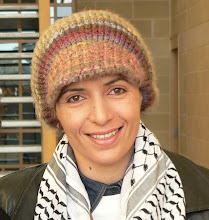Testimony 1: Carnage at Al-Fakhoura School , Jabalia.
"I was working at the [Kamal Edwan] Hospital here in Jabalia, when the ambulances arrived with the dead and injured from Al-Fakhoura school. Most of the dead were women and children, and most of the survivors had terrible shrapnel wounds. We had to turn the maternity ward into a surgical theatre so that we could try to save more lives."
Ayman Al-Majdalawi is a nurse from Jabalia in the Northern Gaza Strip. Yesterday, January 6, he was on duty at Kamal Edwan hospital when the Israeli Occupation Forces (IOF) fired four artillery shells towards nearby Al-Fakhoura school. The United Nations Relief and Works Agency (UNRWA) had just transformed the school into a temporary shelter for dozens of local families, who, like thousands of other local residents, had been driven out of their homes by the IOF's continuing military onslaught. One of the four artillery shells struck the house of Samir Deeb, instantly killing him, his wife, three of his children, five of his brother's children and two female relatives. The other three artillery shells exploded next to Al-Fakhoura school, causing carnage in and around the crowded school. Twenty seven civilians were killed instantly, and more than fifty injured. Women, men and children had limbs torn from their bodies by the force of the explosions.
"The ambulance drivers told me the Israelis were shooting at them as they were trying to evacuate the dead and injured" says Ayman Al-Majdalawi. "When the ambulances arrived at Kamal Edwan, there was chaos. This is a small hospital, and we were trying to save as many people as we could - but a lot of them had already lost arms or legs, and they were bleeding heavily. It was horrific."
Under customary international law, it is illegal to target civilian objects, including schools, hospitals and United Nations facilities. IOF claimed Al-Fakhoura school was targeted because Hamas militants had fired [at IOF] from the school. However, under customary international law, an attacking force is obliged to take the necessary precautions to protect the civilian population against the dangers resulting from military operations. Given the densely-populated, residential nature of the area surrounding the school, an artillery attack in the vicinity could reasonably be expected to cause excessive civilian casualties. As John Ging, UNRWA Director of Operations in the Gaza Strip noted "it was entirely inevitable if artillery shells landed in that area there would be a high number of casualties."
John Ging also stated that his agency had provided the Israelis with exact geographical coordinates of all UN facilities in Gaza , including Al-Fakhoura school. He refuted IOF claims that Hamas gunmen had fired at them from the school. "I can tell you categorically that there was no military activity in that school at the time of the tragedy" he said. "They were innocent people."
Since the Israeli Occupation Forces unleashed 'Operation Cast Lead' on December 27, 2008, at least 682 Palestinians have been killed inside the Gaza Strip, including at least 158 children and 41 women. Another 2,950 adults and children have been maimed and injured, leaving Gaza hospitals at the brink of total collapse. Israeli war planes and tanks are indiscriminately bombing and shelling civilian houses and facilities across the entire Gaza Strip, whilst heavily armed IOF troops shoot to kill on the streets.
Hundreds of thousands of Gazan families are trapped inside their homes, without electricity water or adequate food, terrified of being killed, or buried alive. Meanwhile medical staff like Ayman Al-Majdalawi are risking their lives to reach, and rescue, the dead and injured. "No-where in Gaza safe" he says. "Our ambulances are in danger, and some of the injured people have bled to death because we couldn't reach them. I try to go to other hospitals if I am needed, but it is very dangerous, and like everyone else, we are very frightened."



No comments:
Post a Comment